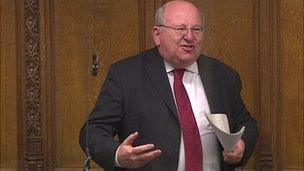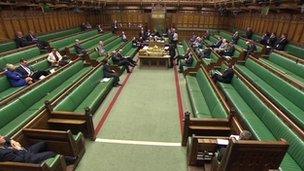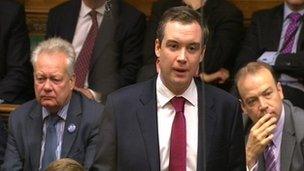EU Referendum Bill: What next?
- Published

Labour MP Mike Gapes appears to be enjoying himself
The game's afoot…again.
It's day two of the Report Stage debate in the Commons on James Wharton's European Union (Referendum) Bill, external, which would allow a vote on the UK's membership in 2017.
The same old tactical games are running, with a few extra wrinkles.
Labour's Mike Gapes, who seems to be enjoying himself rather a lot as he speaks to the many amendments he has put down, announced early on that he has signed a couple of other amendments too.
This boosts his chances of being allowed to speak to those, too, and it gives him some standing in pressing for a vote on them. All of which allows him to use up more time.
As of last week, MPs had considered one of the four groups of amendments on the Bill, and debated the second group a bit.
To do that they had to vote on a closure motion - voting on whether or not to end that section of the debate, and hold a vote on the lead amendment in that group.
Last week, the two votes aimed at ending the first group of amendments took more than half an hour.
But of course it is possible, at the discretion of the Chair, to vote on other amendments within each group….
Which brings me to Adam Afriyie's attempt to bring the referendum date forward to next October.
Will there be a separate vote on that one, or any of the others?
It would certainly be interesting to see how many Conservatives would vote for such a proposition, but a vote would also use up still more time.
And it's time-wasting with a tactical objective.

The Bill is expected to clear the Commons next Friday
The general expectation in Westminster is that the Bill will clear the Commons next Friday, after which it heads off to the Lords.
It's already clear it will not be debated before Christmas (the Lords authorities have not yet announced the Friday sittings, next year, to consider private members bills) and the best guess is a Second Reading debate will finally be held late in January.
At that point a deadline begins to loom.
The Lords is a much more europhile body than the Commons (even on its Conservative benches) and could certainly amend the Bill.
A group of peers around the Lib Dem veteran Lord Roper are said to be cooking up all kinds of cunning plans….
If the bill is amended, the last day set down for private members business in the Commons, when any amendments could be considered is 28 February 2014.
After that, the Bill's in trouble, marooned in the Lords, with no way to get to the statute book.
There are precedents for governments giving a helping hand to private members bills by allowing them to be debated in government time. But this government is a coalition and one part of it, the Lib Dems, doesn't like this bill one little bit. They're unlikely to agree to give it extra time.
So what next?
There's always the Parliament Act.

James Wharton's bill faces further opposition in the Lords
This allows the Commons to override the Lords by passing the same Bill in two consecutive years.
It can be used when the Lords have failed to pass a measure approved by the Commons - not just where something has actually been voted down.
But it would require a Conservative MP to come high in the next ballot for the right to bring in a bill (likely, but not guaranteed) and be willing to pick up a re-incarnated Wharton Bill (it would probably be career suicide to decline) and then the whips would need to insist on hundreds of Conservatives giving up their constituency Fridays in the run-up to an election (unpopular, but they'd probably do it).
Then if the Bill passed the Commons and ran into the buffers in the Lords, Mr Speaker would certify it had met the requirements of the Parliament Act, and it would be off to the Sovereign for signature.
People tend to imagine that the Parliament Act requires some kind of ceremony where the Clerks gather under a blasted oak at midnight, to perform a blood sacrifice and invoke the powers of darkness… but actually the process is quite low key and off camera.
But if the scenario I've outlined were to unfold, the final act would take place in the spring of 2015, in the immediate run-up to the election - which a lot of Conservatives would see as a good dramatic way of securing their flank against UKIP.